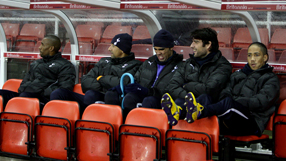IFAB set to agree on new four-substitute rule

The 126th IFAB meeting in Bagshot, south west of London, will also debate the so-called "triple punishment" which is considered too severe for a player stopping a goal-scoring opportunity as sanctions can include a penalty, a red card and a suspension.
Another item on the agenda concerns the "vanishing spray" used at last year's Copa America where referees use a spray on the grass to mark the 10 yards defenders must retreat at free-kicks, with the line vanishing after a few seconds.
IFAB will hear a proposal that increasing the current quota from three to four substitutes over 120 minutes when matches go to extra-time would help improve games and reduce injuries.
"The FIFA Task Force Football 2014, the medical committee and the football committee support the proposal in order to maintain the technical level until the 120th minute and to protect the health of the players," FIFA said in a statement.
As the proposal comes from the Task Force and has been proposed by FIFA, it is unlikely to be blocked in a vote of the board which comprises four representatives from the world governing body and four from the British nations of England, Scotland, Northern Ireland and Wales.
Any amendment to the laws needs a majority of six votes to be passed.
The board will also review the latest tests on goal-line technology, an issue which has been a feature of its meetings for the best part of a decade although the debate appears now to be moving to some kind of resolution.
The best features, fun and footballing quizzes, straight to your inbox every week.
The board will consider progress reports following tests involving eight systems, and decide which will proceed to a scheduled second round of testing starting in March and ending in June.
FIFA said a final decision to approve goal-line technology could be taken at a further extraordinary IFAB meeting, probably on July 2, the day after the Euro 2012 final in Kiev.
IFAB will also study trials of the five-referee system, using additional assistants beside each goal to help referees' decision-making.
That experiment will be used in the European Championships after being used again this season in the Champions and Europa Leagues.
Prince Ali of Jordan, the youngest member of FIFA's Executive Committee, will present a case to IFAB to lift its ban and allow Muslim female players to wear the hijab, or Islamic headscarf, five years after it banned it for safety reasons.
The board will also define exactly what action a referee should take if a dropped ball is kicked directly into goal after a stoppage.
IFAB, formed in 1886, pre-dates the foundation of FIFA by 18 years and is the game's ultimate law-making body.
Changes usually take effect on July 1 ahead of the following season but can be implemented immediately as was the case last year when the board banned the use of snoods, a type of neck-warmer.
 Join The Club
Join The Club





